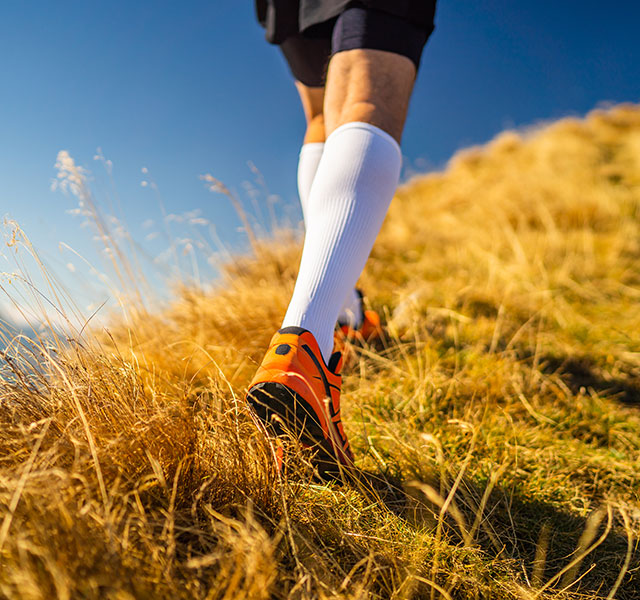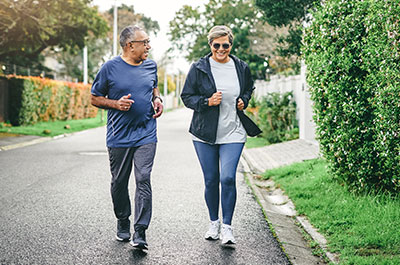Compression socks have been around for decades. You may remember seeing thick and unnaturally flesh-toned versions on your grandparents. How then, have they suddenly become trendy?
Previously only found at medical supply shops, compression socks are now readily available on Amazon or at your local running shop. And you’re just as likely to spot a pair on the person sitting next to you on an overseas flight as you are on someone with a medical condition.
“We prescribe compression socks as an effective treatment tool for people with a variety of health issues,” says Marjan Moghaddam, D.O., a family medicine specialist at Henry Ford Health. “They can also be helpful for people who stand or sit too much.”
How Do Compression Socks Work?
The job of veins is to return blood back to the heart. The veins in your legs—furthest away from your heart—have the most difficult version of this job. They are working against gravity to pump blood all the way up to your heart.
“When you wear compression socks, the extra pressure on your legs helps push the blood back toward your heart,” says Dr. Moghaddam. “That reduces the risk of blood pooling, fluid building up and swelling occurring in the lower extremities.”
Who Should Wear Compression Socks?
Compression socks may be beneficial for anyone with circulation issues or other medical conditions that cause fluid to build up in the legs. These may include:
- Chronic venous insufficiency
- Deep vein thrombosis (DVT)
- Diabetes
- Heart failure
- Lymphedema
- Post surgery
- Pregnancy
- Varicose veins
“I also recommend them to people whose jobs don’t allow them to sit down very often—chefs, surgeons, nurses, hairdressers,” says Dr. Moghaddam. “Standing for long periods of time causes fluid to pool and build up in the legs, and the socks decrease that.”
Compression socks can be helpful for people in the opposite situation—those who will be sitting for hours without much movement. “If you’re on a long flight, all that sitting can cause you to form blood clots,” says Dr. Moghaddam. “Wearing compression socks when you fly improves circulation and reduces the risk of clots.”

Family Medicine At Henry Ford
Can Compression Socks Help Athletes?
The jury is still out on this issue. But there are all types of athletes—and active people—who swear by them for reducing fatigue and improving recovery.
Research on the potential benefits for athletes is inconclusive. Some studies have found limited evidence of any performance improvements in terms of running speed or perceived exertion.
“If there are any benefits, it’s likely more about helping with recovery after exercise,” says Dr. Moghaddam. “Enhancing blood flow after activity could help decrease muscle soreness and speed recovery.”
What to Look for in Compression Socks
Although you can buy compression socks easily and without a prescription, some people need to take more care in choosing them.
“When I prescribe them medically, I encourage people to get fitted at a medical supply store,” says Dr. Moghaddam. “For people with lymphedema or other conditions causing a lot of fluid in the legs, the compression has to be just right.”
People using them for long flights, a job that involves a lot of standing or for exercise recovery, can purchase them from any retailer. Compression socks come rated by how much compression they provide:
- 15 to 20 mmHg (millimeters of mercury) offers light compression.
- 20 to 30 mmHg provides moderate compression and is best for most people.
Copper-infused compression socks are getting a lot of buzz. Proponents claim the copper threads in the socks protect feet from infection and odor and speed wound healing.
But there’s not a lot of science to back up the hype. “There’s nothing wrong with wearing them,” says Dr. Moghaddam. “They may have some benefits, but it’s not scientifically proven.” She also cautions that if you wear copper-infused socks in the sun, they absorb heat and can cause serious burns.
No matter what kind of compression socks you choose, wear them wisely. “You want to make sure they feel tight enough to provide benefits,” she says, “but not so tight that you don’t want to wear them.”
Reviewed by Marjan Moghaddam, D.O., family medicine specialist at Henry Ford Health.



